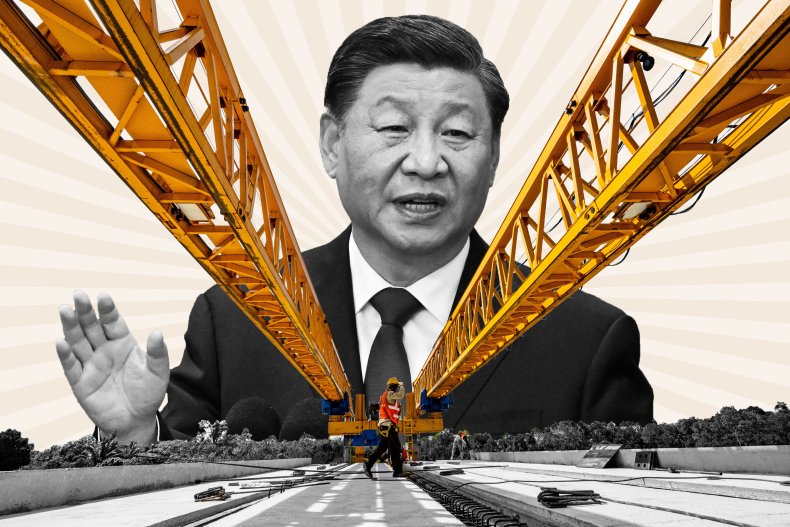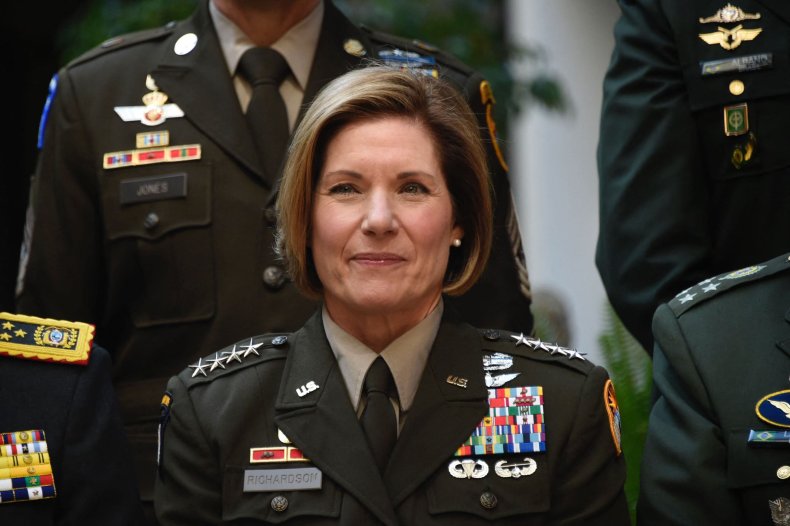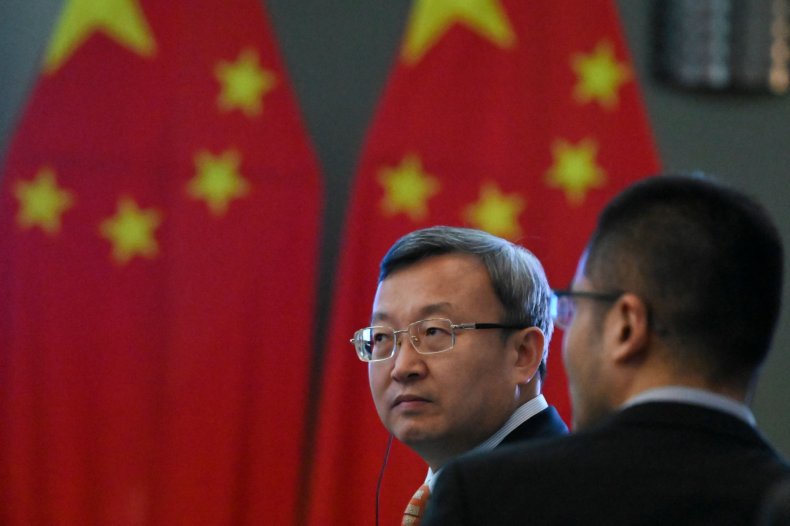China is stepping up efforts to establish a regional presence in the "red zone" on the threshold of the United States, U.S. Southern Command chief Army General Laura Richardson told Newsweek in an exclusive interview.
And while much international attention is being paid to mounting U.S.-China competition in the Asia-Pacific region, Richardson said Beijing's efforts have accelerated "right under our nose", pointing to the growing Chinese presence in the Caribbean, Central and South America.
"They're on the 20-yard line, in the red zone to our homeland," the SOUTHCOM commander said, comparing the situation to that in Asia, where the Indo-Pacific Command (INDOPACOM) is tasked with shoring up defenses utilizing an island strategy developed during the Cold War,
"I could say they're on the first island chain, like they are in INDOPACOM, with what looks to be the instruments of national power that the People's Republic of China brings to bear—diplomatic, informational, military and economic."
A Chinese embassy spokesperson, however, said cooperation in the region was for mutual benefits and not part of any strategic game or targeted at any party.
China's global presence has expanded rapidly, through influence building, technology acquisition and the establishment of infrastructure that could both strengthen China's trade position and serve possible military uses, in line with a stated policy goal of achieving global preeminence by 2049.
Last month, Washington accused China of establishing a spying station in Cuba, something denied by both Beijing and Havana.
Richardson took particular note of Chinese President Xi Jinping's Belt and Road Initiative (BRI), an intercontinental network of infrastructure projects to which more than half of the 31 nations in the SOUTHCOM area of operations have signed on. Given the extent of the BRI, she said the U.S. was competing with a flood of Chinese state-sponsored bids to invest in sorely needed infrastructure such as telecommunications, deep-water ports and even metro systems across the region.
Now, Richardson, who became only the second woman history to be promoted to the rank of Army general in October 2021 and the third to lead a combatant command, said her mission was to demonstrate to the region what "Team USA" has to offer.
"We're part of this hemisphere, we're part of the Americas. It's absolutely important to all of us," Richardson said. "Team USA has a lot to offer. We just need to showcase all the instruments of national power, bring it together to showcase that. We need to do a better job at that."
"Our partners want to partner with us before they want to partner with anybody else," she added. "We've got to be there at the right time and the right place."

Chip War
SOUTHCOM seized upon such an opportunity this month with the 2023 installation of UNITAS, the longest-running multinational maritime exercise in the world. Having wrapped up Friday, the latest round of drills involved some 20 partner nations, including 26 warships and vessels, three submarines, 25 aircraft and some 7,000 personnel.
But there was more than military activity at play during UNITAS. Richardson traveled alongside Secretary of Commerce Gina Raimondo to Panama last week to boost cooperation on the production of semiconductors, a mission in line with President Joe Biden's larger effort to shore up the supply chain as a so-called "chip war" with China heats up across the globe.
Telecommunications is another front on which the U.S. is looking to counter Chinese advances, where China has secured international partnerships to provide 5G networks through companies such as Huawei. But the U.S. has long raised alarms about the security of China-affiliated networks, alleging the existence of backdoors that could provide sensitive information to the Chinese government and the ruling Chinese Communist Party.
Richardson said the rise of such 5G deals in the SOUTHCOM region could prove a major challenge for partnerships that serve as the backbone of U.S. staying power south of its borders.
"If you already have a 3G or 4G network, then, of course, the PRC is going to offer a discount or almost free upgrade to 5G, and then certainly they want to take over the government network," Richardson said. "But then we're not going to be able to partner in terms of sharing information and some of the operations that are done digitally and electronically."
"So, we've got to have better options, Western options, absolutely," she added. "Because we want our partners to have options other than the communist country offering almost dirt-cheap upgrades for the infrastructure for 5G."
Richardson underscored the alleged threat, tying it to a pattern of practices attributed to China by the U.S.
"If you're picking a company that's under a communist government that doesn't honor the human rights of their own people, they're certainly not going to honor the ones of your people," she said. "And the backdoors into government networks, that becomes a challenge."

"Mutual Benefit and Win-Win"
Reached for comment, Chinese Embassy to the United States spokesperson Liu Pengyu defended Beijing's approach in the region.
"China-Latin America cooperation, premised on mutual respect, guided by the principle of mutual benefit and win-win, characterized by openness and inclusiveness and aimed at common development, has delivered tangible benefits to people in the region," Liu told Newsweek.
"China has no geopolitical agenda in Latin America, does not seek to build a sphere of influence, and does not participate in the so-called strategic game," he added. "China-Latin America cooperation meets the needs of both sides and is neither targeted at nor influenced by any third party."
He reaffirmed that "all Latin American countries are sovereign and independent countries" and that Chinese officials "are happy to see Latin American countries develop relations with other countries and respect the close ties formed in the history of this region."
Liu took exception to the characterization offered by Richardson and a growing number of U.S. officials and lawmakers who view Chinese inroads in the Western Hemisphere as an inherent threat, linking it to a 200-year-old policy of establishing a U.S. sphere of influence across the Americas.
"Some people in the U.S. should take off their colored glasses, abandon the outdated Monroe Doctrine and Cold War mentality, stop spreading disinformation about China, stop coercing Latin American countries to choose sides and stop sowing discord between China and Latin America," he said.

The Suspected Military Connection
Beijing and Washington are competing in the military realm as well, though the most recognizable flashpoint remains thousands of miles away from U.S. shores around the disputed island of Taiwan, which also happens to be the world leader in semiconductor production. Chinese officials have also long voiced concern over the efforts of the U.S. to maintain and expand security partnerships and alliances across the INDOPACOM area of concern, which extends to China's own borders.
In recent interviews with Newsweek, senior Air Force commanders hailed the unique capability of the U.S. to overcome what they commonly refer to as "the tyranny of distance" in supporting operations so far from the U.S. mainland.
Now, however, Richardson argues that China has managed to establish its own solution to project global power through its push for new partnerships, while the People's Liberation Army is simultaneously pursuing a historic expansion and modernization effort.
"With the largest military buildup in mainland China of conventional and nuclear forces in the last couple of decades," Richardson said, "you have to ask yourself, 'Why such the investment in critical infrastructure across the globe?'"
"What I worry about is the dual use flipping to the military application if needed," she added. "They've already got their hooks in the critical infrastructure and that's my biggest concern as a military commander and as SOUTHCOM commander."
Echoing what Air Mobility Command chief General Mike Minihan recently told Newsweek, Richardson described China as "our number one pacing challenge in the Department of Defense." And in the SOUTHCOM region, she added, "proximity matters."
"They're in the Caribbean, they're in Central America, in South America," Richardson said. "But all of these countries, other than Cuba, Venezuela and Nicaragua, they want to partner with the United States. We are the partner of choice, but we're not always there at the right time."
In order to win this bout of influence playing out much closer to home than the U.S. is accustomed to competing on such a scale, Richardson said SOUTHCOM is rallying partners in the region to join "Team USA" as to "push forward the democratic agenda for a free, secure, prosperous Western Hemisphere."
"This is what it's all about," she said "We're trying to get after it as fast as we can and bring this economic investment to the beachhead."








